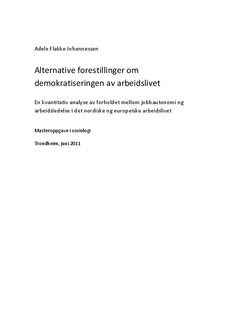Alternative forestillinger om demokratiseringen av arbeidslivet: En kvantitativ analyse av forholdet mellom jobbautonomi og arbeidsledelse i det nordiske og europeiske arbeidslivet
Master thesis
Permanent lenke
http://hdl.handle.net/11250/268415Utgivelsesdato
2011Metadata
Vis full innførselSamlinger
Sammendrag
The democratization of working life is a much debated topic in contemporary sociological research. The focus in this thesis is explicitly on the relationship between work autonomy and hierarchy, in both the Nordic and European working life. This report is based upon OLS and Logistic regression analysis to explore this relationship, based on data from the European Social Survey 2008. Two alternative theoretical frames and scenarios are adjudicated; The democratic and the critical. The former sees a new structure of job organization in line with a general democratisation of working life. While the latter argue that power and control still are present, yet in another form. Neither of these views typically takes differences between countries into consideration. To address this deficiency, this thesis relies on regime theory. Both Duncan Gallie (2003, 2007) and Gøsta Esping-Andersen (1990) have shown that the Nordic countries are distinct from the rest of Europe, with regards to differences in quality of working life. The results suggest a resemblance between the different Nordic countries with respect to Gallies’ and Esping- Andersens’ arguments about difference in quality of working life. However, the resemblance between the Nordic countries is weaker when one looks at the relationship between work autonomy and hierarchy. Rather than a Nordic model of work organization, it seems to be country specific differences. The three main explanatory factors found are country, size of firm and social class.
